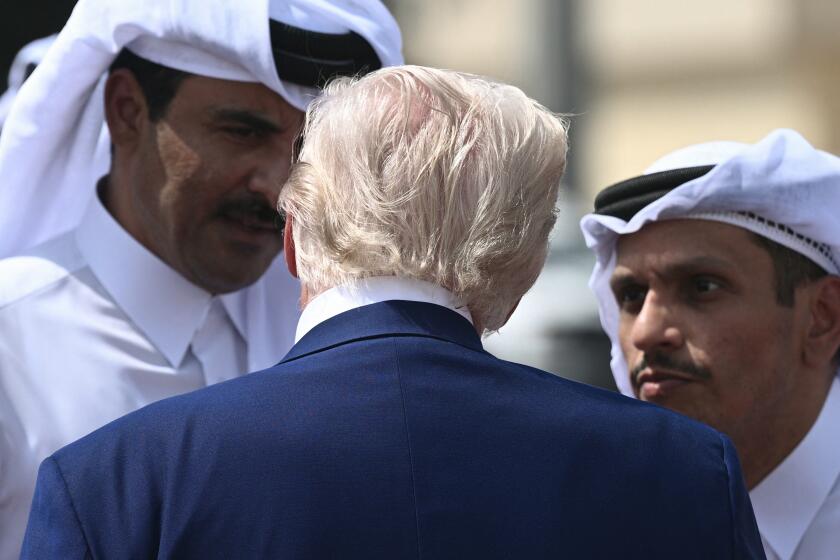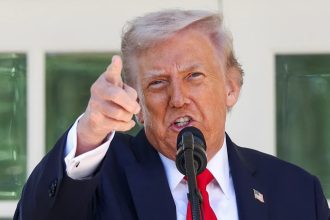For years, Persian Gulf nations staked their defense on one thing above all: A U.S.-supplied security umbrella, paid for with tens of billions of their petrodollars and agreements that allowed the U.S. to dot the Middle East with some of its largest military facilities.
The thinking was that being users of U.S. weaponry and having a U.S. military presence was a virtual guarantee of protection if enemies came to call.
That thinking was upended on Tuesday, when Israel, arguably the U.S.’s top ally, dispatched warplanes and hurled 10 missiles at Hamas’ political office compound in the Qatari capital Doha.
The attack, which targeted the Palestinian group’s senior negotiation team as it was discussing a ceasefire proposal from President Trump, killed five Hamas members and a Qatari security officer. Hamas denies any of its senior leadership was killed.
But whether the targeting succeeded is irrelevant to Gulf leaders pondering the effectiveness of decades-old security arrangements with the U.S.
“The message to the region appears to be, ‘If you think close ties with and major military support for Washington provides protection… think again,’ ” said Hussein Ibish, a senior resident scholar at the Arab Gulf States Institute.
“They’re all vulnerable to attack by larger and more powerful neighbors, and they expect a commitment that helping the U.S. militarily comes with a certain degree of protection. It clearly doesn’t,” he said.
This satellite image from Planet Labs PBC taken on Wednesday shows damage after an Israeli strike targeted a compound that hosted Hamas’ political leadership in Doha, Qatar, on Tuesday. (Planet Labs PBC via Associated Press)
Qatari officials were apoplectic after the strike, calling it cowardly and a violation of the country’s sovereignty.
Especially galling to Qatar — which houses the Al Udeid Air Base, the largest American military installation in the region — is that it allowed Hamas officials to openly live in a well-appointed district of its capital at Washington’s request, just as it had with the Taliban during the group’s negotiations to end America’s war in Afghanistan.
“Everything about that meeting [with Hamas] is very well known for the Israelis and for the Americans. It’s not something we’re hiding,” said Qatari Prime Minister Mohammed bin Abdulrahman Al Thani, in an interview with CNN on Wednesday.
“I have no words to express how enraged we are from such an action [by Israel]. This is state terror,” he said.
Other Gulf leaders — even those harboring lingering reservations about Qatar and its regional policies — presented a united front on Qatar’s behalf.
Saudi Arabia called the strike a “brutal aggression” and said the kingdom would “stand with Qatar without limit.” Bahrain expressed its “full solidarity.”
Read more: Netanyahu ‘killed any hope’ of Gaza hostages release with strike on Doha, Qatar prime minister says
Mohamed Bin Zayed Al-Nahyan, president of the United Arab Emirates, traveled to Doha the next day to meet the Qatari emir — a surprise given how assiduously the UAE has worked to improve ties with Israel as part of the Abraham Accords, the Trump-brokered agreements that saw a number of Arab and Gulf nations normalize relations with Israel in 2020.
“The Gulf states view an external attack on one member as an attack on all,” said Yasmine Farouk, the Gulf and Arabian Peninsula Project director at the International Crisis Group.
Farouk added that trust in the U.S. was already diminished in recent years when Washington failed to defend or respond to attacks on Saudi Arabia in 2019 and the UAE in 2022 by Yemen’s Houthi rebels. Qatar, which suffered through an Iranian missile assault on Al Udeid in June, now has the dubious honor of having its territory become a proxy battleground for both sides of the larger U.S.-Iran conflict.
This week’s strike also represents a setback for the anti-Iran coalition the U.S. has worked to forge with its Arab allies and Israel. But the feeling among many in the Gulf is that Israel is just as belligerent and destabilizing an actor as Iran.
Read more: Netanyahu ‘killed any hope’ of Gaza hostages release with strike on Doha, Qatar prime minister says
“Israel has misinterpreted the willingness of Gulf countries to normalize relations with it as an acknowledgment of its dominance in the region,” Farouq said.
“The Gulf states do not want to live in a region dominated by either Israel or Iran,” she added. “They reject that kind of behavior, rather than rejecting a specific country.”
Israeli Prime Minister Benjamin Netanyahu says the immediate motive for the strike was Hamas claiming responsibility for the killing of six Israelis by Palestinian gunmen in Jerusalem earlier this week. He insisted the operation was planned and conducted entirely by Israel.
Read more: Israel expands campaign beyond Gaza, hitting Hamas leaders in Qatar
At the same time, the more than 1,000-mile distance between Israel and Qatar means Israeli warplanes flew over multiple Arab countries, almost all of them with U.S. bases presumably able to detect incoming aircraft. (The U.S. has 19 bases across the region.) The building the Israelis struck is less than 20 miles away from Al Udeid.
Trump said he learned about the attack shortly before it began and instructed members of his administration to “immediately” inform the Qataris. But Al Thani said the call from the U.S. came 10 minutes after the planes lobbed their missiles on Doha.
In May, when Trump visited Saudi Arabia, Qatar and the UAE, they feted him with grandiose events heavy on the pomp and circumstance and pledged trillions of dollars for investments in the U.S. The expectation was that this would buy some leverage, but Trump is reported to have done little more than scold Netanyahu over Tuesday’s strike, even while stopping short of condemning his actions. (Also in May, Qatar donated a luxury Boeing 747 aircraft for Trump to use as Air Force One.)
The conclusion for Gulf countries expecting U.S. protection from all threats, said Abdulaziz Al-Anjeri, founder of the Kuwait-based think tank Reconnaissance Research, is that some threats are more equal than others.
Read more: Palestinian gunmen kill 6 people in attack on Jerusalem bus stop
“U.S. security assistance is effective against Iran or its allied armed factions, but it does not extend to Israel,” he said, adding that historical alliances with the Gulf don’t carry the same weight for Trump as they may have in the past.
The issue, said Bader Al-Saif, an assistant professor of history at Kuwait University, is that there’s little specificity as to what a U.S. security umbrella actually entails.
“America’s No.1 ally is now striking another American partner, and all they got from Trump is that they ‘felt badly.’ That it happened this way is not in America’s favor,” Al-Saif said.
He added that Gulf nations, especially Saudi Arabia, have been pushing for more formal — and well-defined — defense pacts, but that the relationship with the U.S. needed to reflect recent changes. “You’re here as a security guarantor,” he said of the U.S. “We cannot be cash dispensers if we feel that our basic security is not guaranteed.”
This story originally appeared in Los Angeles Times.









